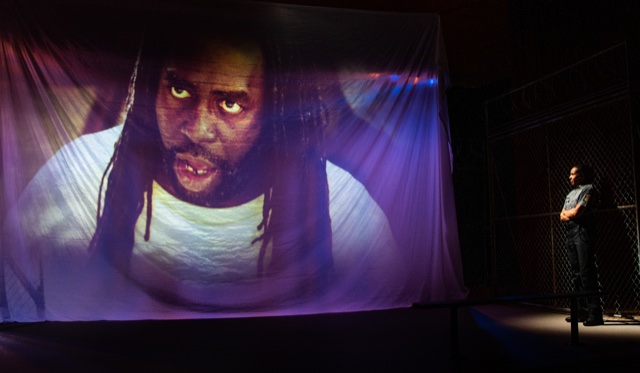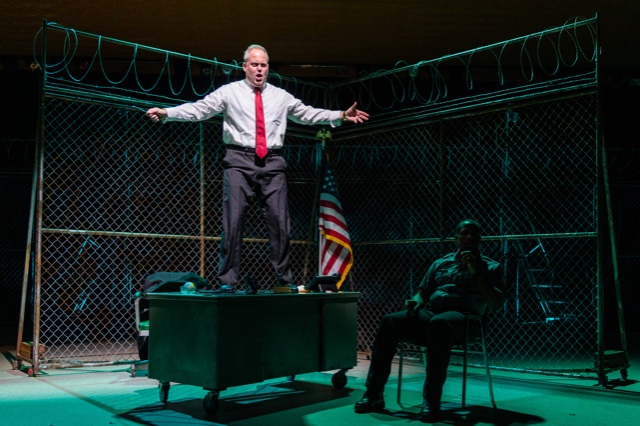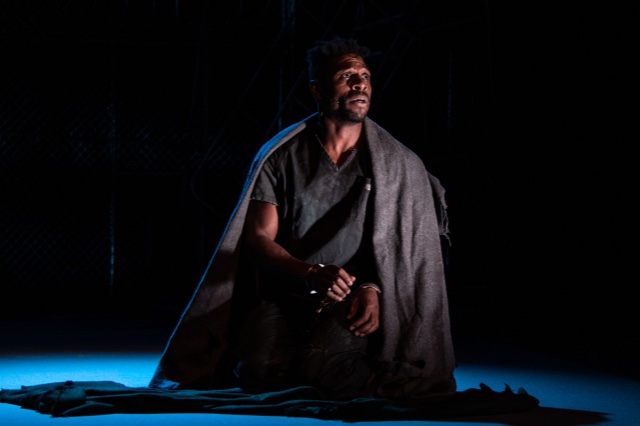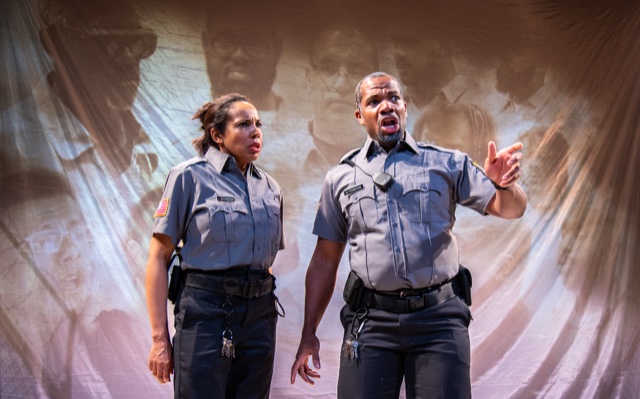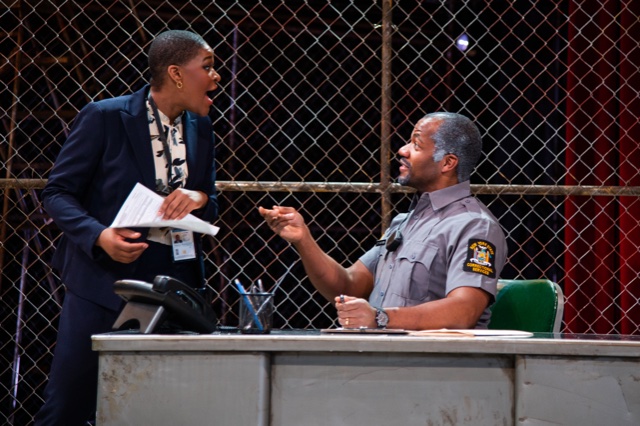Heartbeat Opera's Fidelio
At the Metropolitan Museum of Art
By: Susan Hall - Feb 14, 2022
Heartbeat Opera is a New York based company committed to making opera for the Now. Years before George Floyd was murdered in Minneapolis, they adapted Fidelio, Beethoven’s sole opera, to prison life today.
Prisoners are often incarcerated for minor crimes particularly if they are black. Speaking out and seeking justice disturbs society and our legal institutions. Beethoven knew this. He was swept by the French Revolution. His opera is about shared humanity and the trials of political incarceration.
First presented in 1805, the Viennese theater was nearly empty. Napoleon had just occupied the city. Fidelio underwent two major revisions (and four overtures) before the composer’s ode to freedom was realized. Facing a powerful adversary, Lenore, not just a faithful wife but a radical one, discovers the courage to stand against injustice. The contest in Fidelio is between good and evil, darkness and light. Beethoven was inspired to create many charged musical episodes.
Great music in the opera is sung by political prisoners. Heartbeat's Director Ethan Heard and Music Director Daniel Schlosberg went across the country recording current day prisoners in Ohio, Kansas and Minnesota. Only OnSite Opera in their production of Amahl and the Night Visitors, has reached out to a concerned community. They used local residents who had experienced homelessness for their chorus. This choice was undoubtedly political, but concerned an extension into the neighborhood rather than an extension of the opera’s story. Heartbeat has invited the real characters to join in the prisoner choruses.
Seeing these men and women projected on a flapping white sheet at the Metropolitan Museum of Art leaves no question in our minds that this opera is about revolution, not simply enlightenment.
The opera opens with a solitary Black man raising his fist. A gun shot reverberates. Here is our new George Jackson. (Heartbeat is his Stephen Bingham). The production concludes with a Black woman in the same position. The opera has radicalized a faithful wife. Prisoners are more political than criminal. And even if convicted, they deserve humane treatment.
Fulfilling their mission to give Black artists their rightful due, Heartbeat has a largely Black cast. Only bad guys are white.
Peter Brook, who created a brilliant, abridged Carmen, also produced Why, the story of a convict bound to sit on a hill overlooking a prison and contemplating his crimes. As the convict struggles to understand why he is here, the object of his gaze becomes irrelevant. We come to the quiet conclusion that punishment can be resolved without incarceration.
Beethoven and Heartbeat give us real prisoners trapped in a cruel system, often freed on DNA evidence decades after their convictions. Florestan, solitary prisoner and husband at death’s door, experiences what has been detailed year-after-year by Solitary Watch, the powerful and moving website. It was created by the late James Ridgeway, who edited with Jean Casella.
Like Brook, Heartbeat considers the score and libretto of the original opera in fine detail. Their translation to the present clearly reflects the composer as well as the mood and temperature of our times. Singers Derrell Acon as Roc, Kelly Griffin as Leah/Lenore, Curtis Bannister as Stan/Florestan, Victoria Lawal as Marcy, and Corey McKern, perfect as the dreadful Pizarro, make the vocal evening special.
In this production at the Metropolitan Museum of Art, chicken wire and barbed wire associated with imprisonment glare at us, simply but forcefully making their statement.
Beethoven’s spirit and Heartbeat’s join forces for a brilliant evening of musical theater at the Grace Rainey Rogers Auditorium in New York.
Heartbeat Opera was founded by Ethan Heard (co-founder and artistic director) and Louisa Proske (co-founder and resident director) in 2014, after they graduated from Yale School of Drama’s directing program, to create incisive adaptations and revelatory arrangements of classics, reimagining them for the here and now. Daniel Schlosberg and Jacob Ashworth joined the team as co-music directors from the first season. Derrell Acon became Heartbeat’s first associate artistic director.
Heartbeat Opera’s Fidelio
Music by Ludwig van Beethoven
Original libretto by Joseph Sonnleithner and Georg Friedrich Treitschke
Adapted and directed by Ethan Heard
Music arranged and directed by Daniel Schlosberg
New English dialogue by Marcus Scott and Ethan Heard
Note from the Director:
“We are all implicated when we allow other people to be mistreated. An absence of compassion can corrupt the decency of a community, a state, a nation. Fear and anger can make us vindictive and abusive, unjust and unfair, until we all suffer from the absence of mercy and we condemn ourselves as much as we victimize others. The closer we get to mass incarceration and extreme levels of punishment, the more I believe it’s necessary to recognize that we all need mercy, we all need justice, and— perhaps—we all need some measure of unmerited grace.”
—Bryan Stevenson, Just Mercy
Carved in stone above the entrance to the London Correctional Institution in Ohio are the words, “He who enters here leaves not hope behind.” Inside, on Tuesday mornings, the Ubuntu Men’s Chorus rehearses. One of the singers has a portrait of Bach tattooed on his forearm. At the invitation of the choir’s conductor Cathy Roma, Dan and I visited rehearsal on March 21, 2018.
The Ubuntu Men’s Chorus is one of six prison choirs that are participating in this production. Overall, more than 100 “inside” (incarcerated) singers and 80 “outside” singers (volunteers who visit the prisons) are raising their voices with us.
Fidelio is about hope in the face of despair. In our adaptation, Leah’s husband Stan, a Black Lives Matter activist, has been wrongfully incarcerated by a corrupt warden, but Leah still fiercely hopes she can free him. It is about courage in the face of danger: Leah disguises herself as a correctional officer to infiltrate the facility where she believes Stan is being kept. And love in the face of hate: despite the warden’s racism, love is Leah’s inspiration.
In the midst of great pain, Beethoven’s music has the power to connect and uplift our spirits. Fidelio expresses the yearning for freedom and redemption in us all. Experiencing this music and this story nourishes and strengthens us in these dark times, reminding us of the beauty we, as human beings, are capable of.
In the Ubuntu Chorus rehearsal, Dan accompanied on keyboard, and I filmed. New t-shirts with the chorus logo had arrived, and the singers excitedly put them on over their uniforms. But after I explained in more detail how the footage I
was shooting would be used in the production, one singer nicknamed Frederick Douglass, presumably for his white hair and noble profile, raised his hand, saying,
“We should take off our t-shirts. We’ve got to represent all men in blue.”
This production is dedicated to the men and women behind bars for whom we are responsible, and for the activists who hope, leading us in the fight for justice.
—Ethan Heard, Heartbeat Opera Artistic Director & Co-Founder
In the spirit of this production we list all of the singers from prisons:
This production of Fidelio also features the voices of more than 100 incarcerated singers and 70 volunteers from six prison choirs: Oakdale Community Choir, Kuji Men’s Chorus, Ubuntu Men’s Chorus, Hope Thru Harmony Women’s Choir, East Hill Singers, and Voices of Hope.
Oakdale Community Choir, Iowa Medical and Classification Center Director and Founder: Mary L. Cohen, Ph.D., Associate Professor of Music Education at the University of Iowa Accompanist: Paul Soderdahl
Assistant Director: Laura Kastens
Sound Engineer: Peter Nothnagle
Inside Singers
Christopher Anderson, Christopher Atchison, Mitchell Barta, Bertrum Burkett, Sammy Clayton, Joel Conrad, Steven Dahlstrom, Michael Davis-Carson, Tim Dickerson, Brandon Feighner, Michael Fleming, David Frazier, Daniel Hicks, Wyatt Johnson, Shane Kendrick, Daniel King, Carlos Latorre-Flores, Joshua Lusch, John Lusk, Nathan Matiyabo, Ryan McKelvey, Dallas Miller, Kai Miller, Joshua Morales, Ron Nielsen, Tim Parker, Dustin Perry, Bruce Pollard, John Schondelmeyer, William Slack, Daniel Stanton, Christopher Stickfort, Efrain Umana, Richard Winemiller, Shaylan Yeager, Joel Zamora, James Effler, Rodrigo Estrada, James Hahn, Bill Hildebrand, Nelson Ramirez, Phil Yeoman
Outside Singers
Liz Bonnet, Peg Bouska, Richard Bushby, Samuel Cacciatore, Jeanne Cadoret, Chad Clark, Andy Douglas, Steve Dunham, Barbara Eckstein, Simone Frierson, Lynn Gingerich, Nancy Halder, Colleen Higgins, Laura Kastens, Cinnamon Kleeman, Donneta Knarr, Willis J Knight, Marilyn Knight, Tricia Knox, Margaret Koenig, Pete Kollasch, Kevin Kummer, Maria Ortega Kummer, Kirsten Kumpf Baele, Kayla Lyftogt, Ramona Miller, Morgan Dunham, Anna Mary Mueller, Connie Peterson, Anna Schmall, Katie Seybert, Paul Soderdahl, Devin Tracey, Dorothy Whiston, Anna Wilcox, Joseph Wyse, Mitch Yoon
Kuji Men’s Chorus, Marion Correctional Institution, Ohio Director: Catherine Roma
Tenor
Charles Banks III, Guy Banks, Marcelus Bibbs, Winston Blythe, John Cleggett, Kevin Collier, Roosevelt Gray, Ilyas S. Mumin, Raymel Robinson
Basses
Alrenzo Blandin, Kerron Brantley, Ernest Croft, Michael Powell, William F. Strange, Herman Weaver, Al Wertsch
Hope Thru Harmony Women’s Choir, Dayton Correctional Institution, Ohio Director: Catherine Roma
Accompanist: Rachel Kramer
Inside and Outside Singers Combined
Soprano I Danielle Heckathorn, Raylin Holloway, Ashley Jessup, Em Joy, Camilia Terry, Valerie Blackwell Truitt
Soprano II
Dawnetta Cargle, Angie Denov, Maria Kitsinis, Heather Lerch, Andrea Mitchell, Connie Ramirez, Carol Simmons, Jasmyne Tennant, Pandora Zan
Alto I
Tasha Carr, Denitra Cox, Taniya Froe, Farrin Moss, Diana Porter, Pam Schall, Dorothy Smith Alto II
Barb Brooks, Roxanne Buck, Jonelle Crockett, Kelli Garrett, Linda Koylu, Maggie Morrison, Gwendolyn Shackelford, Donna Tramell
Ubuntu Men’s Chorus, London Correctional Institution, Ohio Director: Catherine Roma
Tenor I
Brandon Bozeman, Chris Charles, Jeffrey Hodge, Anthony McKinney, Chris Nelloms, Nehemiah Williams
Tenor II
Zantika Burton, Kevin Coleman, Julian Gorman, Marquell Madaris, Jesse Morrison, Jared Moseley, Cory Pickett, Rubin Pratts, Saliq Singleton, Jeff Smith
Baritones
Carols Crispin, Gregory Johnson, Eddie Robertson, Ernest Sims, Randy Wallen
Basses
Doug Elliott, Bennie Humphrey, James Smith, Mark Springer, Jan Tucker
East Hill Singers, Lansing Correctional Facility, Kansas A program of Arts in Prison
Conductor: Kirk Carson
Executive Director: Leigh A. Lynch
Thanks to the Kansas Department of Corrections
Inside and Outside Singers Combined
Greg Baacke, Mike Barnes, Roger Beason, Rick Blinn, Scotty Button, Jeff Campbell, Souksavnh Chamnongchith, Gabe Combs, Robert Coppage, Dylan Day, Gary Duncan, Phil Eatherton, Duane Graber, Louis Hamel, Mike Hegge, Christopher Herring, Charles Hise, Clif Hostetler, David Jones, David Joslyn, Johnny King,
John Kingsley, Duane Krehbiel, Bob LeVeau, Sam Loughmiller, Kenneth Mallett, Duane Manis, Jim Marshall, Jay McKell, George Melby, Nathaniel Murken, Cameron Norwood, Danny Pickerill, Ron Post, Paul Priefert, Daniel Ramos, Ken Ratzlaff, Frank Robertson, Randy Schmidt, Wendell Selzer, Marc Showalter, Darrell Spoon, William Stephens, Larry Swinson, Tim Thomas, Cliff Van Blarcom, Bob Walsh, Shawn Wyckoff
Voices of Hope, Minnesota Correctional Facility, Shakopee, Minnesota Conductor: Amanda Weber
Accompanist: Mary Trotter
Anonymous (20)

